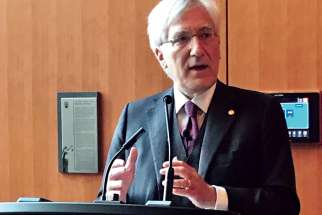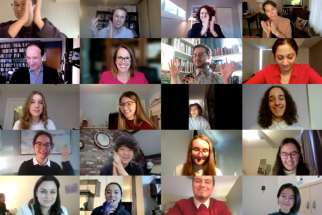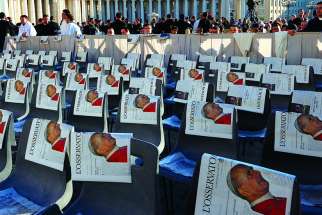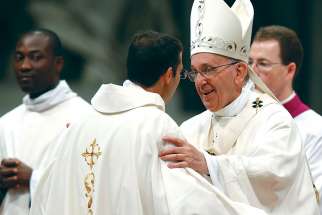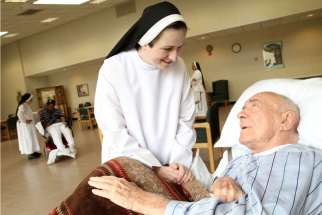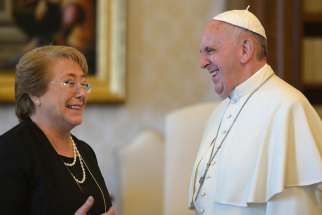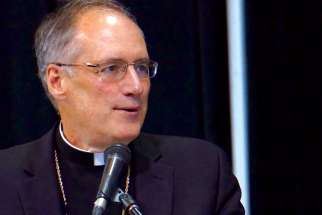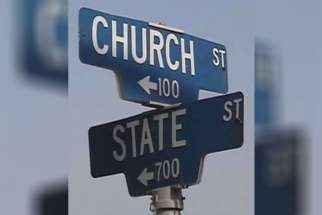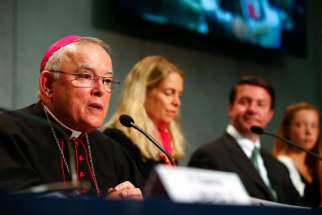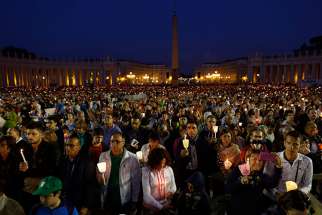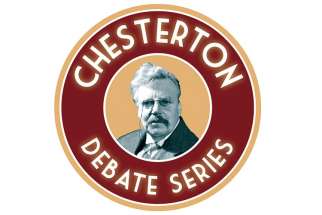Lack of campus debate a ‘scandal’: Catholic academic
The lack of intellectual debate on university campuses is “a scandal” that threatens the very soul of universities, a Catholic academic told a Vancouver audience.
Voters lose when political debate stifled
Pretty much a primary requirement for all-candidate debates in any election is that a government candidate be there to debate why the government should be re-elected.
Ethics Bowl shows what is missing in political discourse
“We look forward to hearing what you have to enrich the discussion,” said one student to an opponent at the second annual Ethics Bowl Feb. 27 in discussing whether or not pardoning criminals gave justice to the victims. “I’m excited to hear what team B has to say,” said another young competitor with a smile.
The summer of 1968, with France undergoing a social revolution and America burning, was not a congenial time for a reaffirmation of traditional morality in face of the sexual revolution. But the courageous Blessed Paul VI did just that in his encyclical Humanae Vitae, published 50 years ago this month.
Pope Francis gives life to married priests debate
Pope Francis’ apparent openness to a discussion about ordaining married men to serve as priests in remote communities has heartened and encouraged at least one Canadian bishop.
Politicians trump people
Green Party leader Elizabeth May made the perceptive point recently that democracy is too important to be left only to politicians. A nuance that might be added is that as a keystone of democracy, free, fair and above all vigorous elections should never become the exclusive preserve of the political actors seeking to benefit from them.
Catholic health cannot support assisted suicide
OTTAWA - For the Catholic Health Alliance of Canada, there is no debate about euthanasia and assisted suicide.
Pope Francis met Chilean President Michelle Bachelet, while outside in St. Peter’s Square anti-abortion protesters drew attention to one of the most controversial topics up for discussion between the two leaders June 5.
OTTAWA - Archbishop Paul-André Durocher has written the Justice Minister requesting that Canada’s Catholic bishops be included in consultations regarding assisted suicide legislation.
The death of debate
With two decisions this spring, the Supreme Court of Canada set laudable boundaries between the necessarily neutral state and the exercise of religious freedom.
American Archbishop 'very disturbed' by Vatican debate on family
NEW YORK - Philadelphia Archbishop Charles Chaput, a leading culture warrior in the U.S. hierarchy, says he was “very disturbed” by the debate over church teachings on gays and remarried Catholics at this month’s Vatican summit, saying it sent a confusing message and “confusion is of the devil.”
VATICAN CITY - Hours before opening a Synod of Bishops whose members have already started a public debate over Catholic teaching on marriage and sexuality, Pope Francis prayed the bishops would express themselves and listen to each other openly, trusting in God to reconcile their differences.
Chesterton debates live on
TORONTO - The spirit of Catholic apologist and author G.K. Chesterton will inspire debate once again in the Archdiocese of Toronto.
Papyrus fragment with reference to Jesus' 'wife' stirs debate
ROME - Scholars are unlikely to agree any time soon on the authenticity of a newly published text containing a reference to Jesus' "wife."
But the tiny papyrus fragment, purportedly dating to the fourth century., has already stirred interest in the early Church's attitudes toward marriage, sex and the role of women.
The fragment of papyrus with eight lines of Egyptian Coptic writing is the "only extant ancient text which explicitly portrays Jesus as referring to a wife," wrote Karen L. King, historian of Christianity at Harvard Divinity School, in an academic paper she delivered Sept. 18 at an international Coptic studies conference in Rome.
"It does not, however, provide evidence that the historical Jesus was married," she wrote, "given the late date of the fragment and the probable date of original composition" at the end of the second century.
The best source of evidence giving an account of Jesus' life and ministry is still the Gospels in the New Testament, King told reporters the next day, "and they are silent about His marital status." But she said the fragment is "direct evidence" that early Christians started debating in the second century whether Jesus could have been married or not.
Fr. Juan Chapa, a New Testament scholar at the University of Navarra in Spain, told Catholic News Service that the "Gospels don't mention marriage, not because they wanted to hide something, but because it was clear that Jesus did not get married, and it's consistent in the Church's tradition." He also noted that the gnostic gospel genre to which the fragment evidently belongs is one of stories about Jesus that mainly take place after the Resurrection, using language that is heavily allegorical. Thus, he said, the fragment's relevant words —"Jesus said to them, 'My wife' ” — were likely not meant as a literal assertion about the life of the historical Jesus.
King said that the significance of the fragment lies in the light it might shed on debates in the early Church over the necessity of celibacy to living a holy life.
According to Michael Peppard, a professor of theology and Coptic language at Fordham University, a belief in asceticism saw rapid development in the second to fourth centuries, especially in Egypt where Christian monasticism was born. Some bishops at the time "were saying that the highest ideal was asceticism," which included renouncing "all the trappings and worries of material life," including marriage. But Peppard said other bishops in the same period "were figuring out how to give everyone their space," and letting it be known it was all right for Christians to live in the world.
The new text published by King may be a sign of early Christians "pushing back" against asceticism and moving closer to mainstream Jewish attitudes "of blessing sex and procreation," Peppard said.
Catholic teaching, Chapa said, holds that "Jesus' celibacy, by differentiating Him from other rabbis, underlines His unique mission to fulfill the kingdom of God, and shows how He embodied the love of God" by renouncing conjugal love.
King said the reference to Jesus' wife could just be a symbol of the Church, akin to the Gospel allegory of Jesus as bridegroom of the Church.
"What if what's missing is saying, 'My wife is the Church?' ” King said.
But both Peppard and King argue that the word does refer to a real person, since the line just below it includes the words: "...she will be able to be my disciple..."
The "wife" in question could be a "spiritual wife," Peppard said. Other texts from the same period uphold "the image of an unconsummated spiritual marriage where the best kind of husband and wife live celibately," he said.
King acknowledged that there would be continued debate over the authenticity of the fragment, whose paper trail goes back only to the 1980s.
"I would say it's a forgery," Alin Suciu, a papyrologist at the University of Hamburg who was attending the conference with King, told the Associated Press. "The script doesn't look authentic" compared to other fourth-century Coptic papyri.
But Roger Bagnall, a papyrologist and director of the Institute for the Study of the Ancient World at New York University, studied the handwriting, the grammar and how the ink was absorbed by the plant fibres, and concluded it was likely to date from the period between 350 and 400.
"We can't ever know or be 100-per-cent sure if it's authentic or a forgery," Peppard said.
King said any properly accredited scholar in the world is welcome to study the papyrus, and that criticism of her findings is part and parcel of any historical study.
"We want to do the best job we can with new historical data," she said.
Chapa called King's discovery "exciting," and nothing for believing Catholics to fear.
"Anything that helps us understand our past, to understand the history of the Church and how the Church defined herself in history," he said, "is very valuable and positive."


